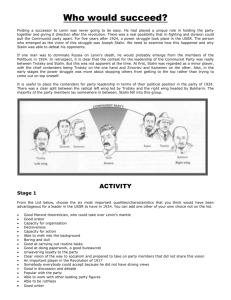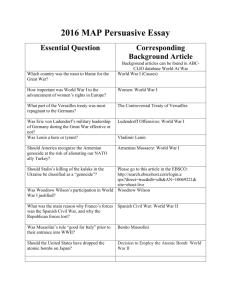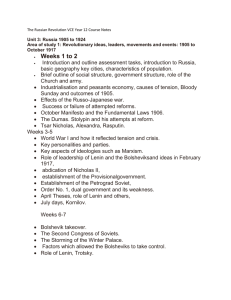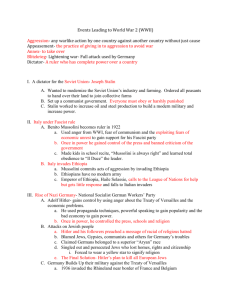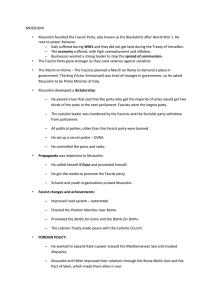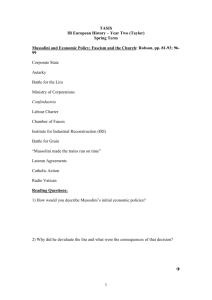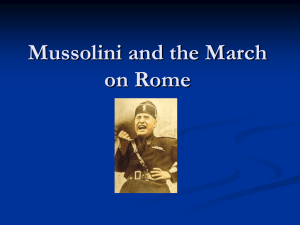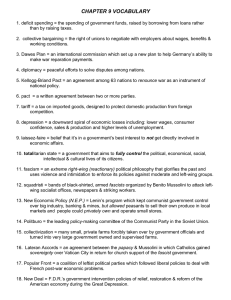Post-Settlement Political and Economic Factors Experimental regimes abounded •
advertisement
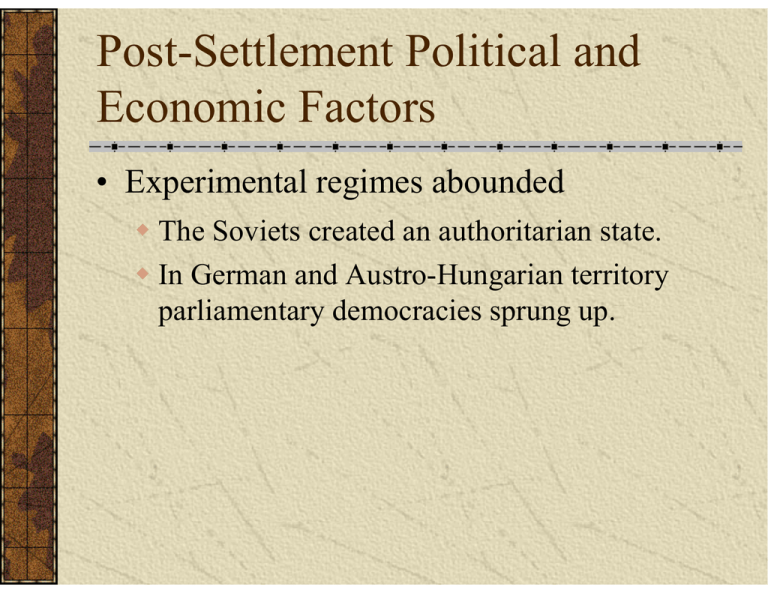
Post-Settlement Political and Economic Factors • Experimental regimes abounded w The Soviets created an authoritarian state. w In German and Austro-Hungarian territory parliamentary democracies sprung up. Demands for Revision of the Paris Settlement • Objections from Nationalist sentiments. • The victors felt that the terms of the settlement were not adequately enforced. Postwar Economic Woes • The war had damaged the economies of Europe’s old states. w The loss of so many people was also a loss of producers and consumers. w Every country had war debts, and no way to repay it. w Losers also had to pay reparations. w Industrial infrastructure had been destroyed • The new states had nothing to begin with. w New borders separated factories from the resources they used. w Railway systems were now split between multiple nations. • The US ceased to be dependent on European production New Relationship between Government and Labor • Unionism had gained new prominence during the war. w Wages were up from pre-war levels. w Collective bargaining and union recognition were now permanent features of the labor market. The Beginning of the Soviet Project • The Bolsheviks had consolidated power. w Party membership did not exceeded 1% of the population w Some opposition still remained. w They viewed their revolution as internationally significant War Communism • Leon Trotsky (1879-1940) organized the Red Army to suppress both internal and foreign opposition. w White Russian opposition could not get properly organized. • The nation was run by Lenin from the top, undemocratically. w The government ran the banks, the transport system and heavy industry. w All opposition was repressed. • War Communism generated opposition. w Peasants resisted the requisition of grain w Strikes in 1920 and 1921 w Baltic fleet mutiny in March 1921. The New Economic Plan (NEP) • Outlined by Lenin in March 1921 w Private industry would be tolerated except for in: • • • • Banking Heavy Industry Transportation International Commerce w Peasant farming for profit was legalized. w The countryside stabilized. The Stalin/Trotsky Rivalry • After Lenin’s stroke in 1922 and his subsequent death in 1924, a power vacuum was left. • Two factions emerged w Trotsky Faction w Joseph Stalin (1879-1953), general secretary of the party, Faction. • Lenin had criticized both before his death, but especially Stalin. Trotsky’s Position • Urged rapid industrialization financed by expropriation of farm production. • Collectivization of agriculture • The Soviet Union should encourage worldwide Socialist revolution Stalin’s Rise • His position of general secretary allowed him to amass bureaucratic and administrative power. • Manipulated intraparty rivalries w Backed Nikolai Bukharin (1888-1938) in his battle with Trotsky over rapid industrialization w Also opposed Trotsky’s position on worldwide revolution • He was thus able to eventually have Trotsky humiliated and exiled by 1929. The Third International • Also called the Comintern, the Third International of the European Socialist Movement was designed by Lenin to promote the Bolshevik style of Socialism in Europe. w 1920-21 conditions were imposed on any socialist party that wanted to join. w Every major European party was split on whether to accept these policies. w These splits helped lead to the rise of facism. Facism in Italy • Facist Governments were anti-Democratic, Anti-Marxist, anti-Parlimentary and frequently anti-Semitic. w Rejected Liberalism. w Dictatorial • Founded in Italy Benito Mussolini (18831945) The Rise of Mussolini • Italian Fasci Di Combattimento, “Bands of Combat,” founded in 1919 in Milan. w Mostly Italian war veterans who rejected Versailles. • Lead by Mussolini w A former socialist w Broke with socialists in 1914, in order to support joining the war on the side of the Allies. w Nationalism replaced socialism in his personal pantheon. • Took advantage of postwar chaos. Early Fascist Organization • Mussolini initially supported factory occupation and land seizures. • He later came to realize that Italians were more interested in order than abstract ideas of justice. w Formed local squads of terrorists to go after socialists and other perceived malcontents w Law enforcement ignored them. • In 1921 Mussolini and 34 Fascists were elected to the government. • The Black Shirt March w In October 1922, the Fascists marched on Rome. w The Cabinet resigned in protest. • On November 23, 1922 the king and Parliament granted Mussolini dictatorial power for one year. The Fascists in Power • Once in power, Mussolini moved cautiously w Changed election laws in 1924, so that the party which received the largest popular vote would have two thirds of the seats in parliament. w In the 1924 election, the Fascists won complete control of Parliament w By 1926 Mussolini was able to rule by decree • Violence and terror continued w Late 1924 Giacomo Matteotti, a socialist leader, was murdered • The Lateran Accord of 1929 made peace with the Vatecan France in the Postwar Years • The French parliament was extremely conservative, opposing social reforms • They initially accepted a role as the leading European power w Wanted to keep Germany weak by enforcing the treaty. w Made treaties with Czechoslovakia, Romania, Yugoslavia, and Poland intended to contain German, but the alliance was weak. • Attempts to enforce reparations w In 1923 France occupied the Ruhr, as punishment for Germany’s defaulting on reparations. w The Germans paid, but Britain was alienated. • Prosperity continued longer than anywhere else in Europe, until 1931. Great Britain After the War • Economic Confusion w The new government in 1919 was a Liberal-Conservative coalition. w The economy was depressed throughout the 1920s. w After 1922 government welfare was the normal means of income for thousands of British families • First Labour Government w In 1923 Labour took over. Though Socialistic in outlook, they were nonrevolutionary. w This was the beginning of the end for the Liberal party. • The General Strike of 1926 w In 1924 Labour fell, and the Conservatives took power again. w In order to make their industry internationally competitive, British management attempted to cut wages. w In 1926 coal miners went on strike, followed by sympathetic workers in other industries. w In the end, they capitulated, but there was continued unrest. • The Empire Crumbled w In the 1920s India gained independence. w In 1921, most of Ireland gained independence. Eastern Europe • The fall of the Eastern Empire created a number of new states w The question became, could those who had previously been powerless rule competently? • Economic and Ethnic Pressures w All of the new states except Czechoslovakia depended on foreign loans w All of the new states except Czechoslovakia fell under authoritarian ethnic rule. Poland • Restored after 130 years of being ruled by its neighbors, nationalism was not sufficient to overcome regional differences. • In 1926 Marshal Josef Pilsudski (18671935) carried out a coup. Czechoslovakia • Czechoslovakia was fortunate enough to have a gifted leader in Thomas Masaryk. w The country worked well until the 30s, when German nationalists looked to Hitler, and he Annexed the Sudetenland while the world watched. Hungary • After the war there was a short lived Communist Republic • Following the fall of the Communists, an aristocratic government ruled Austria • Throughout the 20s there was dissention in Parliament between the Social Democrats and the Christian Socialists • By the 30s the Christian Socialists had control, until the Nazis annexed Austria in 1938. Weimar Germany • The Constitution, while refreshingly Liberal, was also fundamentally flawed, as it allowed small parties to gain seats easily. w The president was permitted to rule by decree in an emergency, permitting presidential dictatorship • The republic also lacked broad popular support. w It was viewed as the government that had saddled Germany with the humiliation of the Versailles treaty. w In the early 20s there were a number of violent uprisings, but they failed w There was massive inflation, due to the reparations imposed by the allies. w The invasion of the Ruhr caused the German people to resent the Weimar government even more. Weimar Germany(cont.) • Hitler and the Early Years of Nazism w Adolf Hitler (1889-1945) made his first major appearance on the political scene in 1923. Along with an number of his followers he attempted a putsch. Though it failed, and Hitler was imprisoned, it made him a hero to many Germans. w Nazism was characterized by extreme nationalism, anti-Communism and antiSemitism. • The Stresemann Years w In order to repair inflation Chancellor Gustav Stresemann introduced a new German currency. w He also agreed to a new system of reparation payments in 1924, which helped to lower inflation. w In 1925, right after the French left the Ruhr, Field Marshal Paul von Hindenburg became president. • Locarno w The 1925 Locarno Agreements helped to integrate Germany back into the European system. w However, its conciliatory outlook continued to alienate the German nationalist public Conclusion • At the close of the 1920s, Europe seemed to be finally breaking out of its postwar doldrums. • However, the coming depression would bring its own set of challenges.
